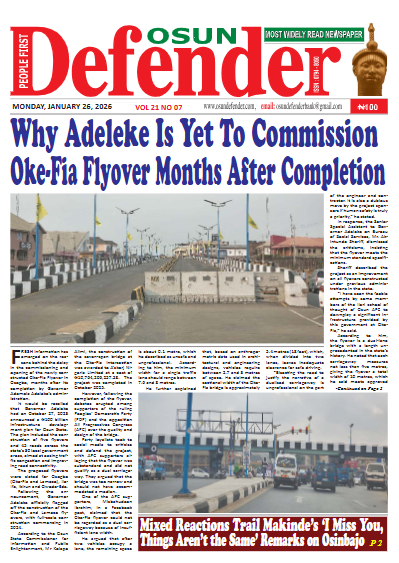The clarifications made by the State of Osun’s Commissioner for Information, Adelani Baderinwa on the fiercely independent and highly respected Lagos Talks FM radio station yesterday was seminal. We give kudos not just to the commissioner for his lucid elucidations but also to Lagos Talks FM for their professionalism.
The station had phoned the commissioner literally out of the blues to speak on the issue of salary payments in the State of Osun. His response was masterful. He completely debunked the
carefully constructed myth that the state owes salaries.
Not many people outside the state are aware that unlike elsewhere, the State of Osun which is a non-oil producing state (with all the fiscal tightness that goes with the designation) is up to date with 65% of the work force who are within GL 1-7 – have had their Full Salaries Paid; 25% of the workforce who are within GL 8-12 (have had 75% of Full Salaries Paid; 10% are within GL 13 and above (and have had 50% of Full Salaries Paid).
This achievement must not be understated. GL 1-7 are the weakest categories, the least protected socially. For the state government to continue to pay them in full, as and when due, is a clear compassionate interpretation of the social justice ethos entailed in the social contract. The overwhelming majority of the states have not interpreted the social contract in this manner.
Laudably, the State of Osun has not used the precarious fiscal situation as an excuse to cancel its rudimentary social safety nets. The greatly admired free elementary school feeding programme has continued without a break. Imitation being the most sincere form of flattery, this programme is now being replicated in some other states and is at the heart of the federal government’s social intervention programmes now too. The Osun programme has been used here by the federal government as the template since there is no sensible reason to reinvent the wheel.
We have to state here that there is a difference between a politician who thinks about the next election, and a Statesman who thinks about the next generation. Here, Aregbesola’s statesmanship and dispositions replicate the attitudes of avatars like, Jahalal Pandit Nehru (India’s first prime minister), the Labour government in the United kingdom 1945-51 and Chief Obafemi Awolowo.
It must be remembered that due to the high level of taxation needed to develop the social and physical infrastructures, Awolowo’s Action Group party continued to suffer electoral reverses in local, regional and the central elections in 1954 and 1959. He remained unfazed with the temporary setbacks. We are all aware of course about the verdicts of history on him and the government he spearheaded.
Ogbeni Rauf Aregbesola is treading the same part, denying himself the luxury and the excuses of the easy way out. The verdicts of history on him will be very positive.
As we have observed before from a healthy perspective, a historical figure to whom Aregbesola approximate, is the legendary Governor of the State of California in the 1950s and 1960s, Edmund G “Pat” Brown. Of him, The Economist had cause to observe that, “It was his determined, almost obsessive investments in the physical and social infrastructure that turned California into an innovative, world class economy,”
Since Aregbesola’s ‘alternative perspective’ has now become the conventional wisdom, it is inconceivable that a new post-Aregbesola government will abandon it and seek to restore licentiousness, waste, as well as lack of planning and foresight. This is reinforced by the way in which the hegemonic base established in another period by the forerunner progressives, such as Obafemi Awolowo and Asiwaju Bola Tinubu continue to endure.









